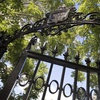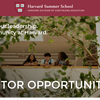{shortcode-b14f0be8271f9a5cc6a234512a17a6f42446e3dd}
Growing up in Palestine, Birzeit University was my childhood dream.
I used to imagine myself walking through Birzeit’s stone courtyards, drawn to its proud place in Palestinian intellectual life. Though my academic path ultimately took me elsewhere, I’ve long been inspired by the university’s cultural depth and spirit of liberation. So you can imagine my deep disappointment when, last month, the Harvard School of Public Health halted its research partnership with Birzeit.
By suspending ties now — when Palestinian universities in Gaza have been bombed to the ground, tens of thousands of students have been displaced or killed, and academic freedom is being violently dismantled worldwide – Harvard makes the grave mistake of siding with repression over solidarity.
Perched on a hill overlooking a group of peaks in the ancient Palestinian village that shares its name, Birzeit is a steadfast bastion of knowledge and resilience. Its campus, surrounded by olive groves and marked by the warm hues of traditional stone architecture, embodies Palestinian identity.
The university offers a robust academic environment through its nine faculties, including in Arts, Science, Engineering, Business, Law, Education, Health, and more. With 83 undergraduate, 45 masters, and four PhD programs, the university fosters a rich academic community. It is also a place where women, in particular, thrive — around 64 percent of enrolled students are women.
A national, independent, and pluralistic university, Birzeit is committed to cultivating leadership, freedom of expression, and a liberal, open intellectual environment. Against all odds, and under decades of occupation, siege, and threat, it has survived and thrived. Its mission of academic excellence, social justice, liberal values, and service to humanity is represented every day by its students and faculty.
Meanwhile, in Gaza, one of the largest Palestinian cities in the world, nearly 90,000 students, per local statistics, have lost access to higher education due to Israel’s complete destruction of all universities since October 2023. Though the poor conditions in Gaza make it nearly impossible, some students, teachers, and faculty have attempted to adapt, shifting to remote instruction. The United Nations Relief and Works Agency is running more than 700 schools for Palestinian refugees, staffed largely by refugees themselves.
Despite the bombings, blackouts, and blockades, Gaza’s students are still trying to learn. Still trying to live. Still trying to build a future in a world that remains silent as their present and future are erased.
Palestinians have long had a near-100 percent literacy rate and are known by many as the world’s “best-educated refugees.” They are recognized as multilingual, high-achieving graduates who often go on to successful careers in fields such as engineering, business, and medicine. Families often sacrifice everything to ensure their children receive an education, believing that learning is a path to freedom, dignity, and a better future.
Birzeit University's message in response to the tragedy in Gaza is clear, as expressed by one of its vice presidents, Dr. Ala Alazzeh: “Right now, there’s a call from Gaza universities for Palestinian and international scholars to volunteer to teach programmes.”
With more than 80 percent of Gaza’s schools damaged or destroyed, according to the United Nations, this plea comes amid what many experts are now calling scholasticide, the systematic destruction of Palestinian education itself. And, against all odds, Palestinians will continue to believe they will always find ways to learn, to teach, and to rebuild what has been torn down.
It is this legacy of resilience and commitment to education that makes Harvard’s recent decision to suspend ties with Birzeit all the more painful to me and to so many Palestinians. The University’s move does not exist in a vacuum. It is part of a broader and more insidious trend that scholars are increasingly calling anti-Palestinian racism and enablement of their erasure.
Anti-Palestinian racism, which has seen a frightening rise in recent years, includes denying the Nakba, justifying anti-Palestinian violence, erasing Palestinian identity and humanity, excluding Palestinian perspectives, suppressing their narratives, and labeling Palestinian advocacy as antisemitic, extremist, or dangerous, often through tactics ranging from reputational smears and career threats to disciplinary investigations, institutional disavowals, and the criminalization of solidarity, particularly within academic spaces.
At its core, it seeks to erase Palestinians from public life and normalizes the habitual denial of their human rights. It isolates students. It silences scholars. It creates a chilling effect so pervasive that some Palestinians feel compelled to hide their identities entirely.
What message is sent when one of the world’s top universities cuts ties with one of Palestine’s most respected institutions during a genocide?
Partnerships that disappear when most needed are not partnerships. They are performances.
Birzeit University, despite everything, will forge ahead. So will Gaza’s students, as long as they are able. Palestinians have always found ways to learn under fire.
Birzeit University does not need Harvard University.
Harvard needs Birzeit to reckon with its own silences, to learn from Palestinian scholars, to be reminded of truth, and to understand what it means to pursue knowledge under siege. In Birzeit, perseverance is practice. The question now is whether Harvard University will find the courage, in its pursuit of veritas, to stand on the right side of history.
Karameh Hawash Kuemmerle is an Assistant Professor of Neurology at Harvard Medical School.
Read more in Opinion
Harvard Shouldn’t Be Coddling Anyone — Liberal or Conservative












